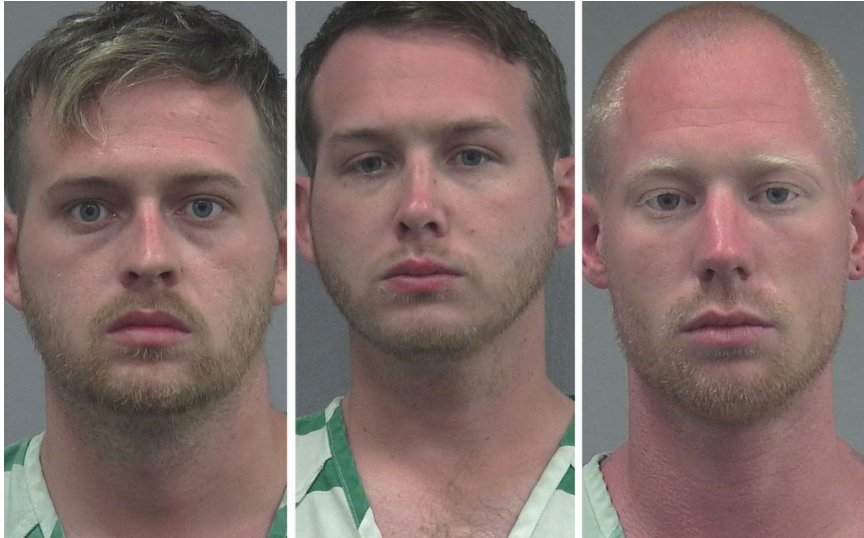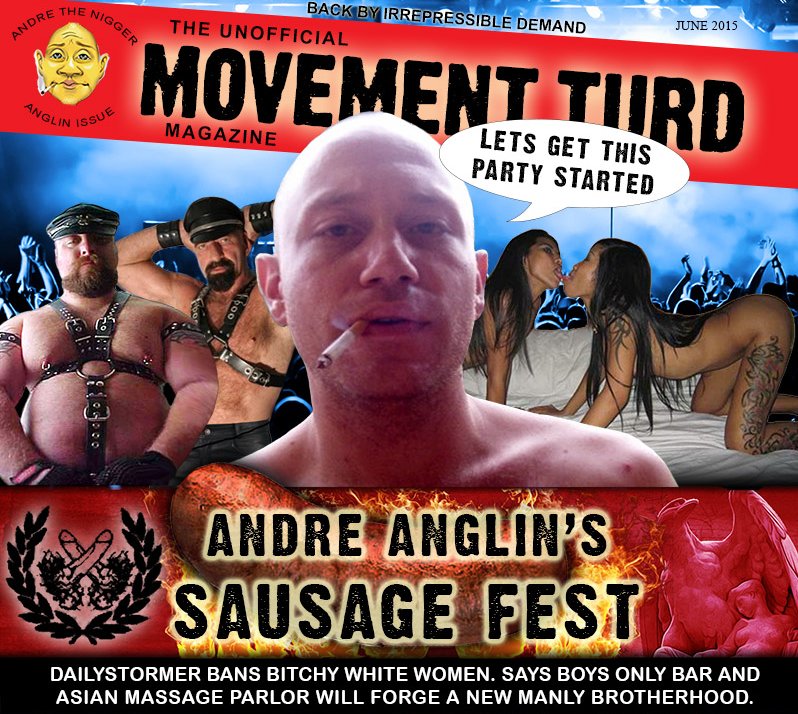Richard Spencer to speak at University of Florida, his 1st campus event since Charlottesville
http://www.richmond.com/washingtonpo...08c6a200e.html
http://christian-identity.net/forum/...7093#post17093
http://whitenationalist.org/forum/sh...7093#post17093

Die Dickie Unter-shiessenkopfen-feeben-FAGGIN-mischling-fuktard-Fuerher, cum-cum, cum-cum!!!
An attorney for associates of white nationalist leader Spencer says he'll sue Ohio State University and the University of Cincinnati if they don't agree by Friday, Oct. 13, 2017 to make campus space available for him to speak. A Georgia college student contacted both schools recently about renting space in the latest effort to have Spencer speak on college campuses..
The University of Florida is reluctantly agreeing to allow Richard Spencer to speak on campus this month, in what will be the white nationalist's first college event since he led torch-bearing white supremacists through the University of Virginia in August.
The Florida event, scheduled for Oct. 19, seems destined to be the next lightning rod at a time when free speech and hate speech are being fiercely debated at campuses across the country.
The university said Thursday it had no recourse to prevent Spencer from speaking because, as a state institution, it must allow all points of view. But it expects to spend $500,000 to ensure security on campus during the event.
The August torch march at the University of Virginia - with people chanting "Jews will not replace us!" - touched off violence between demonstrators and counterprotesters the next day that turned deadly in Charlottesville when a man drove into a crowd, killing one woman and injuring others. Two police officers who were monitoring the protests died when their helicopter crashed.
In the days that followed, several public universities denied Spencer a platform.
The University of Florida initially rejected a request by the National Policy Institute, which Spencer leads, to hold a campus event in September "based on specific security threats," according to Janine Sikes, a university spokeswoman. But Spencer and his supporters - and a lawyer - challenged that decision, citing the First Amendment.
This spring, after Auburn University blocked a speech by Spencer, a federal judge overturned the cancellation, ruling it was unconstitutional to ban the speech based on its content and that there was not evidence Spencer advocated violence.
In September, Cameron Padgett, a Georgia State University student who is helping to organize Spencer's college tour, sued Michigan State University, seeking to force the school to let Spencer speak on campus. The lawsuit claimed the decision to deny the group permission to rent event space violated constitutional rights.
"It's terribly important," Spencer said of the University of Florida's decision. "It's not just important for me. It is clearly a free-speech issue."
"When one just says things that are anodyne or conventional, free speech is not in question," he said. "But when someone says something controversial and radical, then the rubber hits the road."
Sikes emphasized the university had not invited Spencer, and said in a statement, "Although UF leadership has denounced Spencer's white supremacist rhetoric, the university, as a state entity, must allow the free expression of all viewpoints. "
She said the school is charging the institute more than $10,000 to rent the facility and to provide security inside the university's performing arts center, and that additional security costs would be borne by the school.
"Since safety of students, faculty, staff and visitors to campus is the university's top priority, UF will end up paying at least $500,000 to enhance security on campus and in the city of Gainesville," Sikes said.
The University of California at Berkeley has spent hundreds of thousands of dollars on security for controversial speakers this year, as violent clashes between far-left and far-right extremists erupted on campus and in the city.
"The fact that so much money is going to have to be spent on security results directly from people who want to shut down free speech," Spencer said. "They do not want me to go and engage with students, bring new ideas to campus, et cetera. They are attempting a heckler's veto. They are attempting to determine who gets to say things, and what gets said. We need to fight this."
Spencer said he is concerned about violence, especially from antifascist groups.
At other events headlined by Spencer, protesters have joined forces to counter his message or to prevent him from speaking entirely, saying hate speech has no place on their campus.
"It's going to be exciting," Spencer said. "I expect good intellectual push-back from the students. That's part of the fun of it all."
Student government leaders and leaders of the UF Black Student Union did not respond to requests for comment.
Sikes noted that the university has launched a web page to keep the community informed: freespeech.ufl.edu. That page includes a video about the First Amendment, messages about inclusion and answers to questions such as whether students could be excused from a test or assignment that day.
"We understand that this event and possible protest provokes fear, especially for members of our Gator family who are targets of messages of hate and violence simply because of their skin color, religion, culture, sexual orientation or beliefs," school officials wrote on the website. "Faculty have been asked to be understanding with students on a case-by-case basis. However, faculty should not cancel classes without consulting with their dean."
Several buildings will be closed that day, and certain objects will be prohibited, including torches, masks and weapons.
"I urge our campus community to join together, respect one another and promote positive speech, while allowing for differing opinions," W. Kent Fuchs, the university's president, said in a statement. "It is up to every student, faculty member, staff member and myself to demonstrate our university values of respect and inclusion in all that we do. We have an opportunity to lead the way."
http://www.richmond.com/washingtonpo...08c6a200e.html
http://christian-identity.net/forum/...7093#post17093
http://whitenationalist.org/forum/sh...7093#post17093

Die Dickie Unter-shiessenkopfen-feeben-FAGGIN-mischling-fuktard-Fuerher, cum-cum, cum-cum!!!
An attorney for associates of white nationalist leader Spencer says he'll sue Ohio State University and the University of Cincinnati if they don't agree by Friday, Oct. 13, 2017 to make campus space available for him to speak. A Georgia college student contacted both schools recently about renting space in the latest effort to have Spencer speak on college campuses.
The University of Florida is reluctantly agreeing to allow Richard Spencer to speak on campus this month, in what will be the white nationalist's first college event since he led torch-bearing white supremacists through the University of Virginia in August.
The Florida event, scheduled for Oct. 19, seems destined to be the next lightning rod at a time when free speech and hate speech are being fiercely debated at campuses across the country.
The university said Thursday it had no recourse to prevent Spencer from speaking because, as a state institution, it must allow all points of view. But it expects to spend $500,000 to ensure security on campus during the event.
The August torch march at the University of Virginia - with people chanting "Jews will not replace us!" - touched off violence between demonstrators and counterprotesters the next day that turned deadly in Charlottesville when a man drove into a crowd, killing one woman and injuring others. Two police officers who were monitoring the protests died when their helicopter crashed.
In the days that followed, several public universities denied Spencer a platform.
The University of Florida initially rejected a request by the National Policy Institute, which Spencer leads, to hold a campus event in September "based on specific security threats," according to Janine Sikes, a university spokeswoman. But Spencer and his supporters - and a lawyer - challenged that decision, citing the First Amendment.
This spring, after Auburn University blocked a speech by Spencer, a federal judge overturned the cancellation, ruling it was unconstitutional to ban the speech based on its content and that there was not evidence Spencer advocated violence.
In September, Cameron Padgett, a Georgia State University student who is helping to organize Spencer's college tour, sued Michigan State University, seeking to force the school to let Spencer speak on campus. The lawsuit claimed the decision to deny the group permission to rent event space violated constitutional rights.
"It's terribly important," Spencer said of the University of Florida's decision. "It's not just important for me. It is clearly a free-speech issue."
"When one just says things that are anodyne or conventional, free speech is not in question," he said. "But when someone says something controversial and radical, then the rubber hits the road."
Sikes emphasized the university had not invited Spencer, and said in a statement, "Although UF leadership has denounced Spencer's white supremacist rhetoric, the university, as a state entity, must allow the free expression of all viewpoints. "
She said the school is charging the institute more than $10,000 to rent the facility and to provide security inside the university's performing arts center, and that additional security costs would be borne by the school.
"Since safety of students, faculty, staff and visitors to campus is the university's top priority, UF will end up paying at least $500,000 to enhance security on campus and in the city of Gainesville," Sikes said.
The University of California at Berkeley has spent hundreds of thousands of dollars on security for controversial speakers this year, as violent clashes between far-left and far-right extremists erupted on campus and in the city.
"The fact that so much money is going to have to be spent on security results directly from people who want to shut down free speech," Spencer said. "They do not want me to go and engage with students, bring new ideas to campus, et cetera. They are attempting a heckler's veto. They are attempting to determine who gets to say things, and what gets said. We need to fight this."
Spencer said he is concerned about violence, especially from antifascist groups.
At other events headlined by Spencer, protesters have joined forces to counter his message or to prevent him from speaking entirely, saying hate speech has no place on their campus.
"It's going to be exciting," Spencer said. "I expect good intellectual push-back from the students. That's part of the fun of it all."
Student government leaders and leaders of the UF Black Student Union did not respond to requests for comment.
Sikes noted that the university has launched a web page to keep the community informed: freespeech.ufl.edu. That page includes a video about the First Amendment, messages about inclusion and answers to questions such as whether students could be excused from a test or assignment that day.
"We understand that this event and possible protest provokes fear, especially for members of our Gator family who are targets of messages of hate and violence simply because of their skin color, religion, culture, sexual orientation or beliefs," school officials wrote on the website. "Faculty have been asked to be understanding with students on a case-by-case basis. However, faculty should not cancel classes without consulting with their dean."
Several buildings will be closed that day, and certain objects will be prohibited, including torches, masks and weapons.
"I urge our campus community to join together, respect one another and promote positive speech, while allowing for differing opinions," W. Kent Fuchs, the university's president, said in a statement. "It is up to every student, faculty member, staff member and myself to demonstrate our university values of respect and inclusion in all that we do. We have an opportunity to lead the way."








Comment